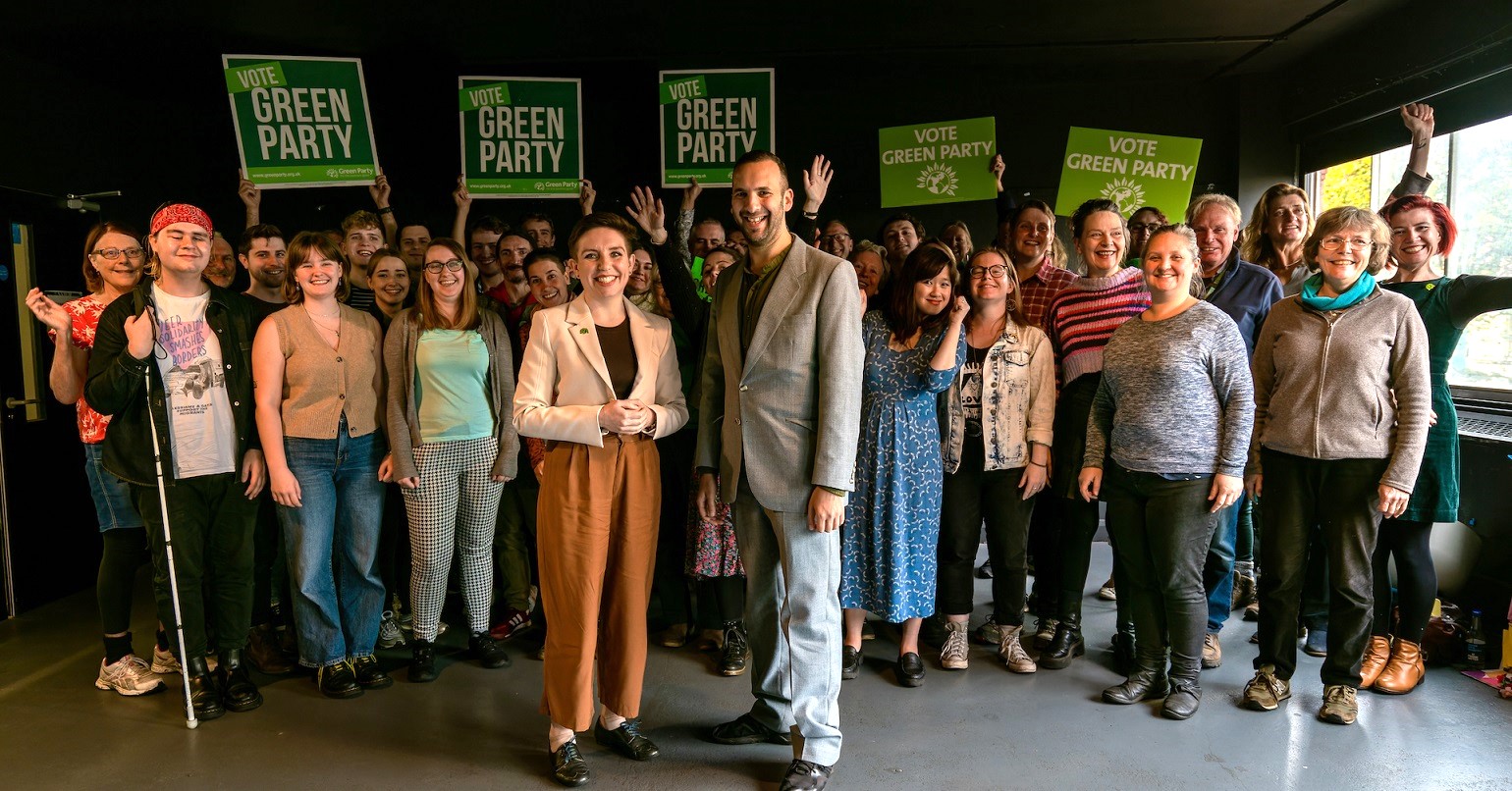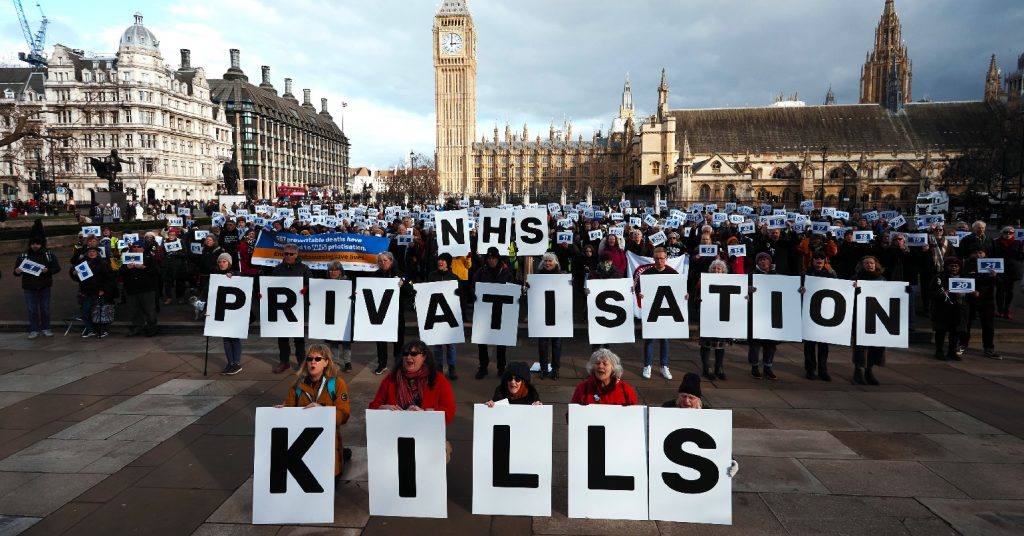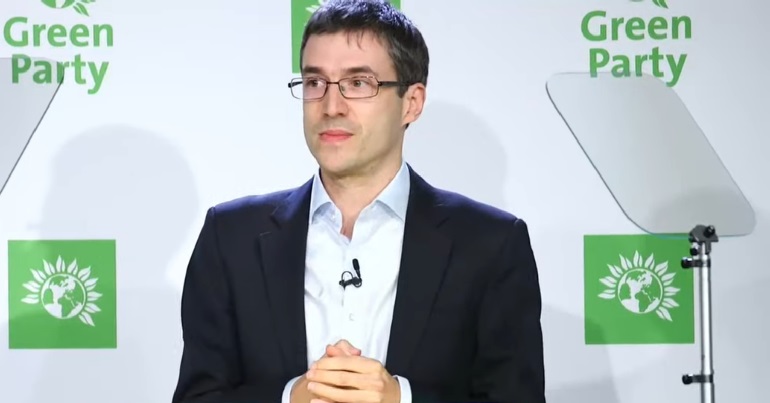Why socialists should join the Green Party #1: Greens want to end the privatisation rip-off

Where should socialists put their energy in 2023? This is a question facing many on the left.
There are some obvious answers. The wave of industrial militancy that has swept across the country has necessitated a solidarity movement alongside it. Campaign groups like Enough is Enough have provided a space for people to begin organising for the economic transformations the country needs. With the climate crisis getting ever more urgent and a socialist solution to it ever more necessary – leftists have an important role to play within the climate movement.
These are all vital movements for the left to be organising within. But most socialists accept that while the collective struggle of social movements and of organised labour are crucial to building a new society, these movements also need a political expression. They need a political organisation able to fight elections, assume political office and – ultimately – wield state power. Since Keir Starmer’s ascension to the top of his party, it is abundantly clear that political expression will not and cannot come from Labour.
Instead, it must come from elsewhere. For a growing number of people – including more than a dozen left wing ex-Labour Councillors, Jeremy Corbyn’s former spokesperson, and outriders and influencers of the Corbyn era – that political expression of the tsunami of rebellion sweeping across the country, the political expression of socialism, will come through the Green Party.
In light of that, our editor Chris Jarvis is writing a new weekly column setting out why disaffected socialists should join the Green Party.
The Green Party wants to end the privatisation rip off
Central to socialism is the understanding that the primary purpose of production in an economy should not be the accumulation of private profit. Instead, it should be to meet the needs of people and the creation of social good – through collective ownership of the means of production.
Since the 1980s, the last vestiges of an economic model oriented towards social good and public need have been extinguished. Now, the scourge of profit-seeking has infected every corner of the economy.
Our public services have been privatised and sold off to companies which syphon billions off to their shareholders while giving us extortionate bills and fares. Social housing has been decimated leaving millions of people exploited by rip-off rents, while landlords laugh all the way to the bank.
The Green Party is the only mainstream party seeking to change this. Greens want to bring all our public services back into public ownership, including public transport, energy, water and the Royal Mail. Green Party health policy would see the NHS reinstated as a fully public service and a publicly funded, free at the point of use system of social care based on the principles of the NHS.
Under the Greens’ vision the disastrous right to buy policy would be ended, allowing Councils to replenish their social housing stock, while rent controls would be imposed on landlords. Proposals from Green London Assembly member Sian Berry would see private renters given the right to transform their homes into cooperatives.
These policies alone would constitute an overwhelming transfer of wealth and assets from private ownership to the public sector, allowing public services and housing to be oriented towards service provision, rather than profit making. Combined with the Greens’ proposals to enable and empower workers to transform their workplaces into worker owned cooperatives, the Greens have a vision for an economy transformed – an economy where those who are recipients of a service or who are producers of a product are placed at the heart of production – not the billionaires, the ultra-wealthy and the private shareholders.
By contrast to the Green Party’s position, Labour’s offer is tepid at best. Yes, they say they will bring the railways into public ownership. As for water? Energy? Royal Mail? Not a chance. On the NHS, shadow health secretary Wes Streeting has talked up his pro-market credentials, repeatedly making the case for reliance on the private sector in the health service. Labour don’t have the radical proposals we need on housing. And they have nothing to say about democratising the rest of the economy.
The truth is that Keir Starmer would leave the balance of economic ownership almost wholly unchanged. He is a free-marketeer in a red rosette.
PS. We hope you enjoyed this article. Bright Green has got big plans for the future to publish many more articles like this. You can help make that happen. Please donate to Bright Green now donate to Bright Green now.
Image credit: Rob Browne – Creative Commons




A very encouraging article for socialists. However, why are a number of the most significant policies mentioned in the article not reflected by the ‘Political Programme’ shown on the Green Party website? A fully public NHS, nationalisation of energy and restoration of trade union rights are significant policy commitments that are not reflected on the Green Party site. Having been severely misled by Starmer who reneged on all his leadership pledges, socialists will be very wary of pledges which do not have the full commitment of the Green Party.
Hi Mike,
Because the Green Party is a non-whipped party, it is easier for members, including the leadership to veer from stated position.
However, unlike Labour, the Green Party is very democratic, with the leadership having to stand for re-election every couple of years.
What Starmer did was shocking. To make “pledges” to get elected and then renounce those pledges is deeply anti-democratic.
Any Green leader that did that would have to face re-election within two years and would be unlikely to survive as leader.
Robert
Many thanks for your helpful reply Robert. There is still very much the issue for me that the Green Party policies (as stated on their website) do not include such policies as a fully public (non-privatised) NHS and nationalisation of energy and rail. That these are not addressed on the website is concerning.
I would point out that being for public ownership and accountability of public services doesn’t necessarily mean “nationalisation” in all cases, when often regions and local authorities may be better at running services or as municipal companies, including some aspects of health and social care and for example local trains. Whereas, for example, intercity rail and medical/pharmacy procurement are better nationalised.
Personally, as an ecological socialist, I think the Green Party is a good match for most people who call themselves socialists but not all socialists. For example, if a more traditional desire for fully centralised “nationalisation” is key to you, then I can understand your concerns.
I agree the energy policy is a bit vague. I would like to see explicit public ownership of energy suppliers and the national grid. Although I’m happy with policy EN094 for companies that procure energy to the public.
Green Party policies are available online at https://policy.greenparty.org.uk/
Rail
“TR230 The Green Party believes that the rail system, including track and operators, needs to be publicly owned, and would seek to bring the service back into public ownership.”
NHS
“HE104 Healthcare is not a commodity to be bought or sold. The National Health Service must provide healthcare, free at the point of need, funded through taxation. It must be a public service funded by, run by and accountable to local and national government and devoid of all privatisation, whether privatised administration, healthcare provision, support services or capital ownership. The NHS is concerned with healthcare provision and should not be subject to market forces either internal or external.”
Energy:
EN094 Fair competition will be ensured to encourage diversity of ownership of the energy system including public, municipal and community schemes.
Water:
NR428 The Green Party is opposed to the private ownership of water, which will have severe environmental and social consequences, and to the implications for land ownership, particularly in upland areas. We believe that the water service should be run with the direct participation of the communities concerned.
Workers rights, trade Unions and industrial disputes:
https://policy.greenparty.org.uk/home/long-term-goals/wr.html
There wasn’t one paragraph that I felt neatly covered your concerns. You would have to read the whole page.
Here is the 2019 manifesto:
https://www.greenparty.org.uk/assets/files/Elections/Green%20Party%20Manifesto%202019.pdf
I hope this comes across as an honest reply. And I wish you the best of luck in finding, voting and perhaps becoming a member of a party that you feel you can trust and best represents you.
cheers Robert
Robert, I appreciate the efforts you’ve made to chase down published policy in response to Mike’s comment. Thank you for that. But I have to say that as a Green Party member myself, and an ex-Labour member, I share his opinion. I have been frustrated by the absence of these policies in the Political Programme, and by the convoluted wording of the policy on NHS privatisation, especially while trying to answer questions on social media.
To attract new socialist members and voters, and to gain wider support in general, the Green Party needs all of its policies to be stated clearly and succinctly, and to be easily accessible. People rightly expect to be able to vote for a clear policy platform. It’s unrealistic to expect people to simply trust that we will deliver on radical policies that we don’t prioritise and highlight.
I have finally got around to making my small monthly contribution to Bright Green. This new series of articles is an excellent initiative. A coherent vision of how we can act in the present to build towards a better society is what will draw the healthiest and least sectarian activists towards the Green Party.
A very timely article, relevant to all left-leaning members of the Labour Party as disaffection grows week by week.
I’m reading ‘The New Enclosure’ by Brett Christophers, which points out that by far the largest privitisation has been of land. Of course as Greens we’d address this issue, at least in part, through a Land Value Tax.